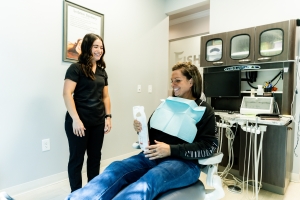Do You Have Obstructive Sleep Apnea?
Do you wake up feeling exhausted, find it hard to focus throughout the day, or experience constant irritability? These could be more than signs of poor sleep—they may be symptoms of obstructive sleep apnea (OSA).
If you suspect OSA or are unsure if you have a sleep disorder, contact our Hilliard, OH, dentist at (614) 771-6060 for an evaluation. Early intervention can improve both your sleep and overall health.

What Is Obstructive Sleep Apnea?
Obstructive sleep apnea is a common but serious sleep disorder where the muscles in the back of your throat relax excessively, causing airway blockages during sleep. These interruptions result in disrupted breathing patterns, leading to restless sleep and a range of health complications. OSA can be mild, moderate, or severe, and prompt diagnosis is key for effective treatment.
Health Risks of Ignoring OSA
Failing to treat OSA can have serious health impacts, such as:
- Heart disease and hypertension
- Increased risk of stroke and type 2 diabetes
- Cognitive decline and memory issues
- Higher risk of accidents due to daytime sleepiness
Symptoms of Obstructive Sleep Apnea
Symptoms of OSA may present differently during the night and day.
Nighttime Symptoms
The nighttime symptoms of obstructive sleep apnea include:
- Loud, persistent snoring
- Gasping or choking during sleep
- Frequent pauses in breathing
- Restless sleep or waking up frequently
These symptoms can disrupt not only the individual’s sleep but also the sleep of their bed partner. If you or your bed partner notice any of these symptoms, especially when trying to fall asleep, seek medical assistance for proper evaluation and diagnosis.
Daytime Symptoms
During the day, individuals with obstructive sleep apnea may experience the following symptoms:
- Excessive daytime drowsiness
- Morning headaches
- Difficulty concentrating
- Mood swings or irritability
These symptoms can have a considerable effect on a person’s quality of life, affecting work performance, social interactions, and overall well-being.
OSA Causes and Risk Factors
Obstructive sleep apnea can have various causes and risk factors, including:
- Obesity: One of the most significant risk factors for OSA is obesity. Excess fat in the neck and throat can put pressure on the airway, making it more likely to collapse during sleep.
- Neck Circumference: Individuals with a larger neck circumference are at higher risk, as a thicker neck may have a narrower airway.
- Gender: Men are more likely to develop OSA than women, although the risk for women increases if they’re overweight.
- Age: OSA is more common in middle-aged and older adults. However, it can occur at any age, including in children.
- Family History: There is evidence to suggest that OSA can run in families, indicating a genetic component.
- Smoking: Smoking can increase inflammation and fluid retention in the upper airway, making it more susceptible to obstruction.
- Alcohol and Sedative Use: The relaxation of throat muscles due to alcohol or sedative use can increase the likelihood of airway collapse during sleep.
- Nasal Congestion: Chronic nasal congestion or a deviated septum can make it harder to breathe through the nose, leading to increased reliance on mouth breathing, which can contribute to OSA.
- Medical Conditions: Certain medical conditions, such as hypothyroidism, acromegaly, and polycystic ovary syndrome (PCOS), have been associated with an increased risk of OSA.
- Enlarged Tonsils and Adenoids: In children, enlarged tonsils and adenoids can obstruct the airway and lead to OSA.
- Craniofacial Abnormalities: Structural abnormalities in the face and skull can affect the size and shape of the airway, increasing the risk of obstruction.
- Gastroesophageal Reflux Disease (GERD): The association between GERD and OSA is complex, but GERD can exacerbate OSA and vice versa.
- Menopause: Postmenopausal women may have an increased risk of OSA due to hormonal changes and weight gain.

Diagnosing Obstructive Sleep Apnea
Consultation and Medical History
During a consultation for OSA, a sleep specialist will conduct an evaluation and diagnosis of the condition. This can include:
- A comprehensive medical history review is taken
- Physical examination, including an examination of the throat, neck, and mouth, is performed
- You may be recommended to undergo a sleep study to assess the severity of the condition
Sleep Studies
Sleep studies are conducted either in a specialized laboratory or at home using a portable monitor, which is considered the most reliable approach for diagnosing obstructive sleep apnea, as it measures breathing disruptions during sleep.
During a sleep study, the following are monitored:
- Respiration
- Motor activity
- Cardiac rate
- Time taken to enter different stages of sleep
After a confirmed diagnosis, you’ll return to our dental office in Hilliard, where we’ll go over your treatment options.
Treatment Options for OSA
CPAP
Continuous positive airway pressure (CPAP) therapy is the first-line treatment for moderate to severe OSA. It works by keeping your airway open with pressurized air delivered through a mask worn during sleep. CPAP not only improves sleep quality but can also lower blood pressure and reduce cardiovascular risk factors.
Oral Appliances
For those who can’t tolerate CPAP, a custom-fitted oral appliance might be recommended. This device repositions the jaw and tongue to keep the airway open, making it an effective alternative for mild to moderate OSA. Regular check-ups with your dentist are crucial to monitor its effectiveness and adjust as necessary.
Lifestyle Changes
Simple lifestyle changes can reduce OSA symptoms, such as weight loss, avoiding alcohol and sedatives, and adopting healthy sleep habits. Improving sleep hygiene—such as sticking to a regular sleep schedule—can greatly benefit those with OSA.
Surgery
Surgery is typically considered when other treatments fail. Options include uvulopalatopharyngoplasty (UPPP), genioglossus advancement, or even a tracheostomy, which focuses on removing or repositioning tissues that block the airway. Surgery is rare and often a last resort for severe cases.

Frequently Asked Questions
What causes obstructive sleep apnea?
Obstructive sleep apnea is caused by a blockage of the airway due to several factors, such as being overweight or obese, having large tonsils, or changes in hormone levels.
Can you fix obstructive sleep apnea?
Although obstructive sleep apnea is usually not curable, treatment can effectively assist the majority of individuals in reducing breathing interruptions, enhancing sleep quality, and mitigating health-related repercussions.
What is the difference between obstructive sleep apnea and central sleep apnea?
While obstructive sleep apnea (OSA) is caused by a physical obstruction of the airway, central sleep apnea (CSA) involves the brain’s inability to properly signal the muscles responsible for breathing.
Get the Treatment You Need for Sleep Disorders
Obstructive sleep apnea is a prevalent and potentially severe sleep disorder that affects a significant portion of the global population. If you’re struggling with a treatment that works best for you, contact our dentist in Hilliard today at (614) 771-6060.
We’ll set up your appointment. We proudly serve patients from Columbus, Dublin, Upper Arlington, Grove City, Westerville, and nearby communities in Ohio.






